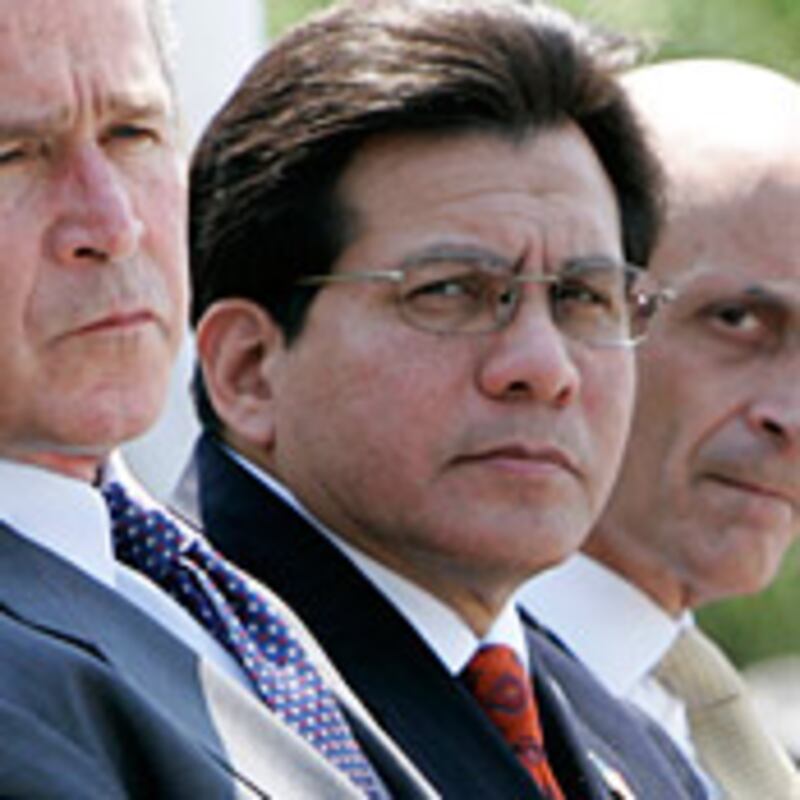
In a dramatic turn in Madrid this morning, Spain's attorney general has stepped into the case involving former U.S. Attorney General Alberto Gonzales and five former senior Bush administration lawyers, overruling the decision of career prosecutors to adopt a criminal complaint against them and to proceed with an investigation. But this does not mark the end of the case—it now goes back to Judge Baltasar Garzon, who had originally launched the case and must decide whether it will go forward notwithstanding the Spanish attorney general’s call. Garzon retains ultimate authority in the matter.
The Spanish attorney general appears to have adopted arguments that were previously offered by the Bush Justice Department.
As previously reported in The Daily Beast, Spanish prosecutors attached to the central criminal court, the Audenica Nacional, reached a decision this week to proceed with the criminal case against Gonzales and the five others who were involved in decision making—Federal Appeals Court Judge and former Assistant Attorney General Jay Bybee, University of California law professor and former Deputy Assistant Attorney General John Yoo, former Defense Department general counsel and current Chevron lawyer William J. Haynes II, Vice President Cheney’s former chief of staff David Addington, and former Undersecretary of Defense Douglas J. Feith—to introduce a regime of harsh interrogation techniques including torture at Guantánamo.
A 37-page justification of the conclusion was prepared and circulated within the prosecutors’ office earlier this week. This morning, however, Spain’s attorney general, Candido Conde Pumpido, announced that he had overridden the career prosecutors’ decision and would not permit them to adopt the complaint. The attorney general stated that any torture investigation should focus on those directly engaged in implementing torture techniques. He dismissed the notion that lawyers could be held accountable simply for issuing legal opinions, and suggested that this process was privileged and somehow insulated against criminal inquiry. “We cannot support this action,” he stated, referring to the pending criminal complaint. In so doing, the Spanish attorney general appears to have adopted arguments that were previously offered by the Bush Justice Department and which were raised by Douglas J. Feith in his own defense in a column published two weeks ago in The Wall Street Journal.
The Spanish prosecutors report to the attorney general and he is entitled to review and modify their decisions much in the way that the U.S. attorney general supervises and directs the work of career federal prosecutors. Interventions of this sort, however, are fairly unusual. “The circumstances of the attorney general’s announcement suggest that political intervention at a very high level has occurred,” remarked one lawyer involved with the complaint. The attorney general’s intervention may well reflect the concern of the government of Prime Minister Jose Zapatero over relations with the new Obama administration. The Spanish and U.S. governments have been working to improve relations following a rocky period under President Bush.
The criminal case against the Bush Six remains pending with the Audencia Nacional and before Judge Garzon, and the Spanish attorney general’s decision not to adopt the case makes it far more likely that Garzon himself will retain control of the case. In the Spanish criminal-justice system, the decision as to whether a criminal prosecution will go forward rests with the judge—not with the prosecutors or the attorney general.
In the meantime, the Bush Six remain subject to possible arrest or extradition at the discretion of Judge Garzon or another judge of the Spanish courts. It is highly unlikely that extradition would be sought at this point, according to reliable sources, but if any of the defendants were to travel abroad—particularly to any of the 25 countries in which the European arrest warrant is honored—they might face arrest. A similar process launched the case of former Chilean dictator Augusto Pinochet, which was initiated and conducted by Judge Garzon.
Scott Horton is a law professor and writer on legal and national-security affairs for Harper's magazine and The American Lawyer, among other publications.






